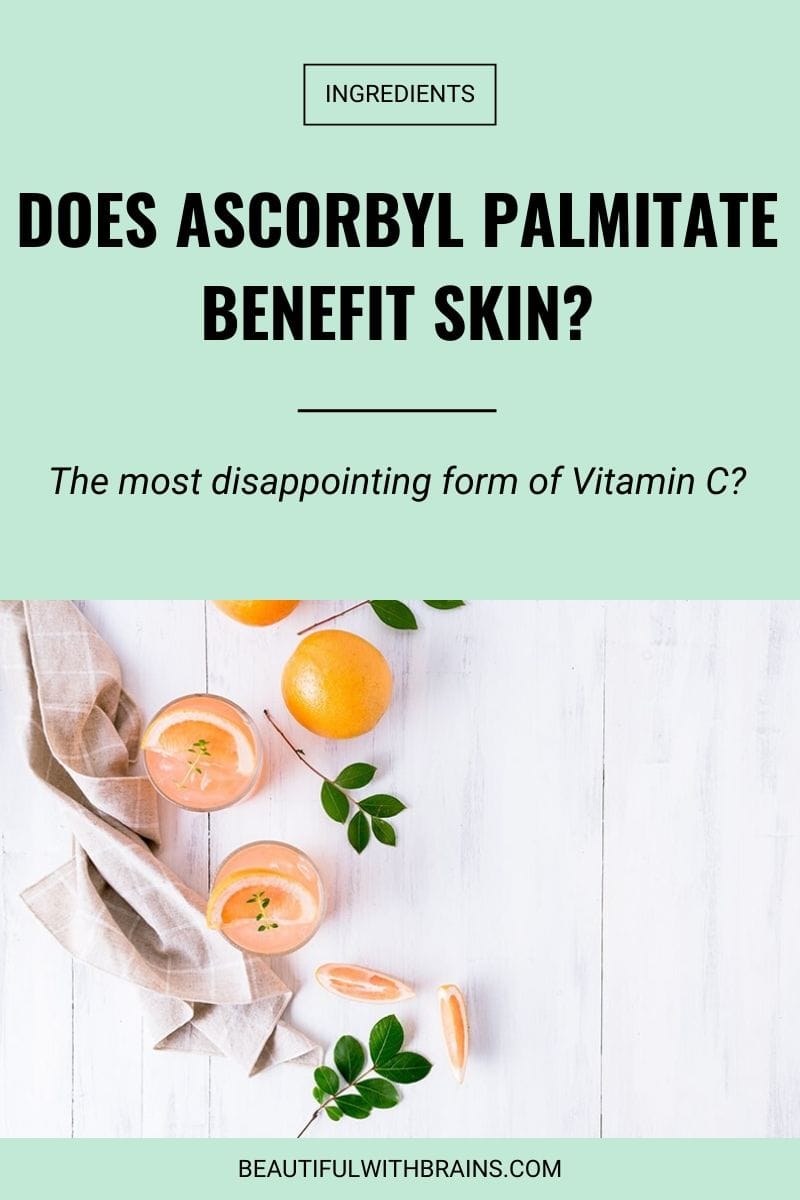
Ascorbyl Palmitate is the black sheep of the Vitamin C family. While all the other members are hard at work to fight off wrinkles, boost collagen production, and brighten the complexion, Ascorbyl Palmitate has slackened on the job a little. It simply hasn’t proven its worth, yet. Does it mean it doesn’t work or that you shouldn’t use it?
Here’s why this is my LEAST fave form of Vitamin C:
What Is Ascorbyl Palmitate?
Ascorbyl Palmitate is a derivative of Vitamin C. It’s made from L-Ascorbic Acid (the pure form of Vitamin C) and Palmitic Acid (a moisturising fatty acid).
While most types of Vitamin C derivatives are water-soluble, Ascorbyl Palmitate is fat-soluble. That’s why you’ll often find it in products with an oil or silicone base.
Related: The Most Common Types Of Vitamin C In Skincare: Which One Is Right For You?
How Does Ascorbyl Palmitate Benefit Skin?
L-Ascorbic Acid is one of the most powerful antioxidants in skincare. It fights off and destroys free radicals before they can wreak their damage on the skin and leave you with wrinkles and dark spots.
Ascorbyl Palmitate retains its antioxidant properties, too. It’s particularly good at reducing environmental damage, including UV radiation.
Instead, I couldn’t find any proof that Ascorbyl Palmitate also has L-Ascorbic Acid’s other superpowers, i.e. fading away dark spots and boosting collagen.
It may simply mean that no one bothered to do a study on it yet. But until we have proof it can do the job, this is a Vitamin C derivative you can cross off your skincare list.
Related: The Complete Guide To Vitamin C In Skincare Products
Need help creating an anti-aging routine that really works? Sign up to the newsletter below to receive the “Anti-Aging Skincare Routine Cheatsheet” (it includes product recommendations, too!).
How Does Ascorbyl Palmitate Compare To Other Forms Of Vitamin C?
Not too well, I’m afraid.
The whole point of Vitamin C derivatives is to have all the anti-aging benefits of L-Ascorbic Acid (LAA) without the irritation and the low shelf life. Ascorbyl Palmitate fails in a couple of areas:
- Effectiveness: Vitamin C derivatives work only IF they can penetrate skin and convert into L-Ascorbic Acid. Ascorbyl Palmitate is oil-soluble, so it does penetrate skin. But studies show it can’t increase the skin levels of LAA. This means either that the conversation doesn’t happen or that you need incredibly high amounts (higher than anything you’ll find in skincare) to make it happen.
- Stability: L-Ascorbic Acid goes bad within a few short weeks (especially if not properly formulated with extra preservatives and antioxidants). In terms of stability, Ascorbyl Palmitate is similar to LAA. In other words, it goes bad almost as quickly.
If Ascorbyl Palmitate happens to be in a serum or cream you’re eyeing, go ahead and buy it.
But if you’re specifically looking for a Vitamin C serum, make sure this isn’t the only derivative in it. If it is, leave it on the shelf.
Related: Why You Shouldn’t Make Your Vitamin C Serum At Home
What Are The Best Skincare Products With Ascorbyl Palmitate?
Those that contain other forms of Vitamin C. You can still try this derivative and get results:
- Intraceuticals Booster Vitamin C+3 (AUD$49.00): Available at Adore Beauty
- Marie Veronique Vitamins C, E + Ferulic Acid ($90.00): Available at Credo Beauty and The Detox Market
Does Ascorbyl Palmitate Have Any Side Effects?
I wouldn’t call them side effects. Ascorbyl Palmitate is gentler than L-Ascorbic Acid, so everyone can use it without irritation. Even sensitive skin.
But it does go bad quickly. Plus, in skincare products it’s usually present in concentrations that are too small to do much of anything.
In other words, it’s not dangerous. Just disappointing.
Related: Can You Use A Vitamin C Serum If You Have Sensitive Skin?
The Bottom Line
Ascorbyl Palmitate is one of my least fave forms of Vitamin C. It has some antioxidant properties, but there’s no proof it boosts collagen or brightens skin, too. Plus, it has a very short shelf life.
What are your thoughts on Ascorbyl Palmitate in skincare? Let me know in the comments below.


Thanks for another helpful article! 🙂
.-= Tavia´s last blog ..Collistar Sun Kissed Collection for Summer 2010 =-.
Tavia, you’re welcome. Glad you enjoyed it.
Your articles are so helpful. I’m so glad I found this site!
I was almost going to but this serum which was packed with various types of vitamin C but they were all towards the end of the list. This was including Ascorbyl Palmitate.
Thanks so much!
Katrina, thanks. I’m glad you find my posts useful and I hope to see you around often in the future.
It’s a shame that companies put such little concentrations of good ingredients in their products that just don’t do anything, isn’t it? You’re welcome, I’m glad I could help you save some bucks. 🙂
I really appreciated your info on Ascorbyl Palmitate. I am a licensed Medical Massage Therapist in practice for many years.. Currently I am putting together my formula for massage oil using coconut oil as a base.. I wasn’t sure about adding Ascorbyl Palmitate….By what you are saying I feel the benefits out way anything negative.. I know for some it can cause pores to clog causing one to break out in acne.. I always wipe off a certain amount of oil when I know they have sensitive or oily skin. Anyway what you brought out is very helpful. I can use this information.
Thanks,
Burt
Burt, my pleasure!